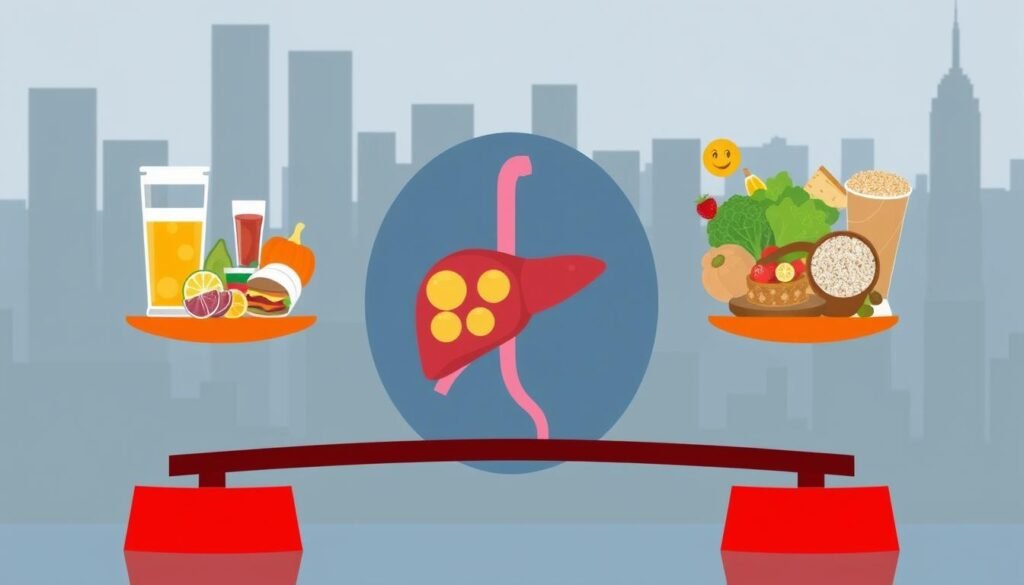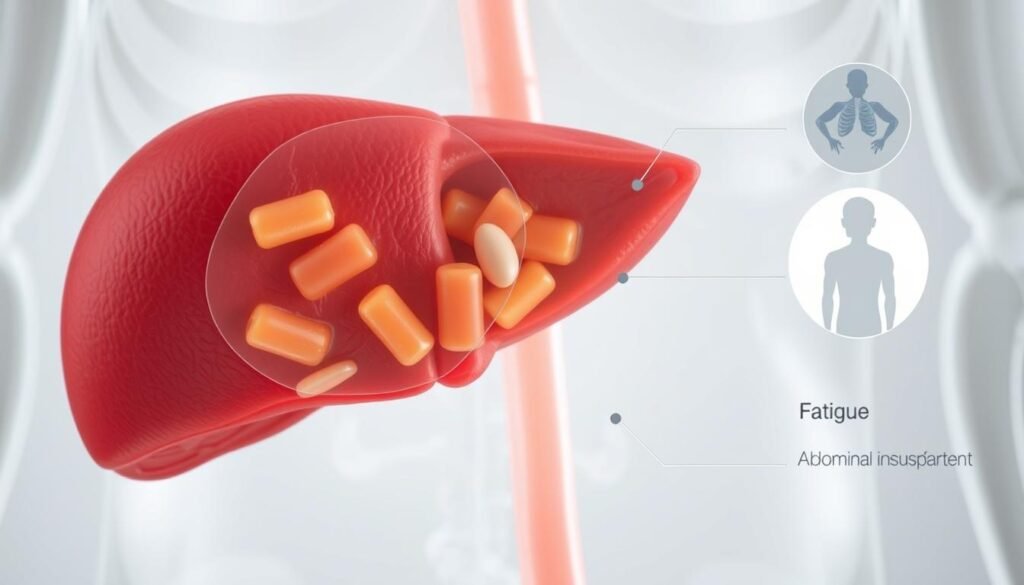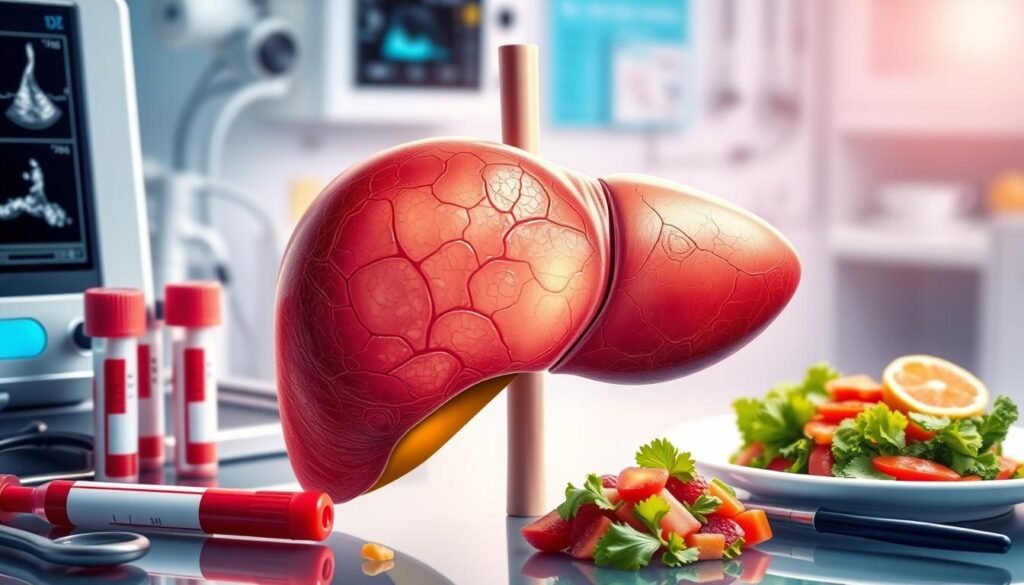Did you know that nearly 25% of adults in the United States have non-alcoholic fatty liver disease (NAFLD)? This fact shows a growing concern about liver health. It’s crucial to understand this condition. Excess fat in liver cells can lead to serious problems if not treated.
Taking care of your liver is very important. The liver helps with detoxification, metabolism, and digestion. Knowing about liver disease, including NAFLD, is important. It can lead to serious issues like cirrhosis or liver cancer. Learning about this can help us take steps to keep a healthy liver.
For more information on fatty liver disease, read this article from the National Institutes of Health. Understanding this condition can help us make better choices. This can lead to better liver health and overall well-being.
Key Takeaways
- NAFLD affects nearly 25% of U.S. adults, stressing the need for awareness.
- Early diagnosis and management are crucial for preventing severe liver issues.
- Healthy lifestyle choices can significantly reduce the risk of liver disease.
- Education about fatty liver disease is essential for promoting liver health.
- Regular check-ups can help in early detection and effective treatment.
What is Fatty Liver Disease?
Fatty liver disease is when too much fat builds up in the liver. It messes up important liver function. It’s key to know what fatty liver disease means. It comes in two types: one related to drinking alcohol and one not. The type not related to alcohol is more common now, especially with more people becoming obese.
This issue can lead to liver swelling. Without treatment, it can get worse, causing cirrhosis or liver cancer. Knowing about liver health overview shows why it’s vital to catch and manage this disease early. It’s often found in those who are overweight, showing how widespread it is.
Being overweight, insulin resistance, and high cholesterol can all lead to fatty liver disease. To lower the risk, eating right and staying active are important. They improve liver function and fight fatty liver disease. For extra details, check out this resource.
Understanding Fatty Liver Disease: Causes and Risk Factors
Fatty liver disease comes from many factors. It’s key to know what contributes to it. Certain risk factors for fatty liver make people more likely to get it. This disease has two main types: Alcohol-related liver disease and Metabolic dysfunction-associated steatotic liver disease. It’s critical to see how our genes and lifestyle affect our risk.
Genetic Factors
Genetics play a big role in getting fatty liver disease. If liver diseases run in your family, you have a higher chance of getting them too. Knowing your genes helps spot your risk of fatty liver. This knowledge can help you take steps to prevent it.
Lifestyle Choices
Your way of living greatly affects your liver’s health. Eating lots of sugar and bad fats can make fat build up in your liver. Not exercising and being overweight make this worse. By changing these habits, you can lower your chance of fatty liver disease.
Other Health Conditions
Health issues like diabetes and high blood pressure also pose risks. They’re linked with metabolic problems leading to fat in the liver. Taking care of these conditions can boost your liver health and lower your risk. For more info on fatty liver disease, visit this resource.

| Factor | Description |
|---|---|
| Genetic Predisposition | Family history increases risk of fatty liver disease. |
| Lifestyle Effects | Poor diet, inactivity, and obesity contribute to fat accumulation. |
| Other Health Conditions | Diabetes and hypertension elevate risk factors for fatty liver. |
Fatty Liver Symptoms: Recognizing the Signs
It’s important to catch fatty liver symptoms early for the best outcome. At the beginning, many people may not spot any symptoms. This makes it tough to catch fatty liver disease early on.
Being aware of common symptoms can help spot liver issues quickly.
Sneaky Symptoms
Early symptoms can come on quietly. They include:
- Fatigue
- Unexplained weight loss
- Discomfort in the upper right abdomen
These signs are easy to ignore, and many think they’re not a big deal. Spotting these signs is crucial for keeping an eye on liver health.
Advanced Symptoms
As the disease gets worse, you might see more serious symptoms. These include:
- Jaundice (yellowing of the skin and eyes)
- Swelling of the abdomen
- Confusion or difficulty concentrating
Knowing these signs is vital. It helps people seek help fast. This highlights the need for regular check-ups.

Diagnosing Fatty Liver Disease
To diagnose fatty liver disease, doctors start with a few key steps. They often begin with blood tests to check how your liver is doing. They also look at your overall health. Then, they use imaging tests like ultrasounds and CT scans to look at your liver. Sometimes, a liver biopsy is needed to get a closer look at the liver’s tissue. Knowing about these tests can help you take care of your liver.
Blood Tests and Imaging
For fatty liver diagnosis, doctors first check your liver function with blood tests. If your liver enzymes are high, it might mean your liver isn’t working right. They use imaging tests to see your liver more clearly and check for fat. These tests include:
- Ultrasound
- CT scans
- MRI scans
These imaging methods help doctors see how much fat is in your liver. They can also find any unusual growths that might cause problems.
Liver Biopsy: When is it Necessary?
Doctors think about a liver biopsy when they need to tell different liver diseases apart. For example, they might want to know if you have simple fatty liver or something more serious like NASH. You might need a biopsy if:
- Your liver tests are still abnormal after making lifestyle changes
- Doctors aren’t sure about your diagnosis after looking at images
- They need to know how much damage there is to your liver

This test gives a clear diagnosis. It helps doctors choose the best treatment for you.
| Diagnostic Method | Purpose | Characteristics |
|---|---|---|
| Liver Function Tests | Assess liver health | Blood sample analysis for enzyme levels |
| Imaging Techniques | Visualize liver condition | Non-invasive; includes ultrasound, CT, MRI |
| Liver Biopsy | Determine liver damage severity | Invasive; tissue sample taken for analysis |
Fatty Liver Treatment: Options Available
Treating fatty liver involves changes in lifestyle and possibly medications. It’s crucial to focus on liver health management. This approach helps tackle the disease effectively.
Medications
Some people might need medication options for underlying issues linked to fatty liver. Diabetics, for instance, may use insulin sensitizers. Those with high cholesterol could need statins. These drugs help lower liver fat and tackle other health risks.
Lifestyle Modifications
Lifestyle interventions are key in fighting fatty liver. Eating a diet full of fruits, veggies, whole grains, and lean proteins helps the liver. Regular workouts, such as aerobics, aid in weight control and liver health. It’s also vital to quit smoking and cut down on alcohol.
When to Seek Specialist Care
It’s important to know when to get a healthcare provider’s help. If symptoms get worse or lifestyle changes don’t work, see a specialist. They can offer personalized advice, more tests, or new treatments. This ensures the best care for your liver.
How to Prevent Fatty Liver: Essential Strategies
To stop fatty liver, mix healthy lifestyle changes together. Eating right and working out regularly are key. They help keep your liver in good shape and cut your disease risk.
Dietary Recommendations
Eating balanced is crucial to prevent fatty liver. Focus on:
- Fruits and vegetables: They give you vital vitamins and antioxidants.
- Lean proteins: Foods like chicken, fish, and beans help keep muscles strong.
- Whole grains: Foods such as brown rice, quinoa, and oats aid digestion.
- Limit saturated fats: Cut down on trans fats and sugars.
- Stay hydrated: Drinking water boosts liver function.
Exercise Routines
Staying active is important for exercise for liver health. It helps with keeping a healthy weight and improving your metabolism. Try these exercises:
- Cardio activities: Aim for at least 150 minutes per week of walking, jogging, or biking.
- Strength training: Do resistance workouts twice a week.
- Flexibility exercises: Yoga or stretching can make you feel better overall.
By focusing on the right food and exercise, you can learn how to stop fatty liver. This will help you live a healthier life for years to come.
Liver Health Tips for Daily Living
Making simple changes to your daily life can improve your liver health. Keeping hydrated and avoiding toxins really helps. These habits can make you healthier overall.
Importance of Hydration
Drinking enough water is key for a healthy liver. It helps flush out toxins and supports digestion. Water also moves nutrients around and keeps toxins low.
- Drink at least 8-10 glasses of water daily.
- Include hydrating foods such as fruits and vegetables.
- Avoid sugary and caffeinated beverages that may dehydrate.
Avoiding Toxins
Staying away from toxins is vital for liver health. They can cause inflammation and damage. Be careful with your food and surroundings.
- Limit alcohol intake to reduce liver stress.
- Avoid exposure to environmental pollutants.
- Choose organic products when possible to minimize pesticide exposure.
| Tips for Liver Health | Benefits |
|---|---|
| Stay Hydrated | Enhances toxin elimination and digestion |
| Avoid Alcohol | Reduces risk of liver damage |
| Choose Organic | Minimizes exposure to harmful chemicals |
| Consume Nutrient-Rich Foods | Supports overall liver function |
Complications of Fatty Liver Disease
Fatty liver disease can lead to serious health issues if it gets worse. One big risk is NASH, where the liver becomes inflamed. This can lead to even more liver damage over time.
Progression to Non-Alcoholic Steatohepatitis (NASH)
Those with fatty liver disease may end up with NASH if it’s not treated. NASH makes liver inflammation worse and increases the risk of cirrhosis. This is why regular doctor visits and health checks are crucial.
Risk of Liver Cirrhosis
Liver cirrhosis is serious scarring caused by continued liver harm. It can lead to liver failure and a higher chance of getting liver cancer. Knowing about this risk is a big reason to look after your liver health.
Impact on Overall Health
Fatty liver disease affects more than just the liver. It can also increase your risk for heart disease and diabetes. If you notice early signs, getting more information can help. Websites like Hopkins Medicine are good places to start. Staying alert and informed is essential to avoid serious problems from fatty liver disease.